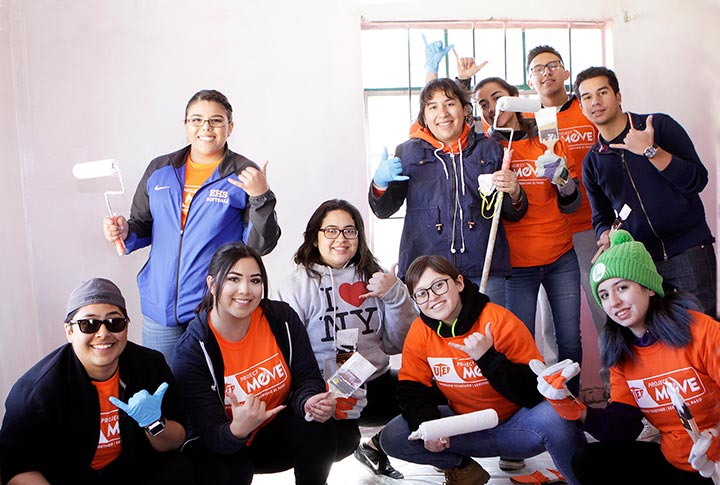UTEP Honored by Governor's Office for Addressing Community Needs
Last Updated on August 16, 2018 at 12:00 AM
Originally published August 16, 2018
By UC Staff
UTEP Communications
The University of Texas at El Paso (UTEP) is the 2018 recipient of the Higher Education Community Impact Award. Texas First Lady Cecilia Abbott, honorary chair of the 35th annual Governor's Volunteer Awards, announced the 2018 award recipients on Aug. 15.

The Governor’s Volunteer Awards, administered by OneStar Foundation, honor the contributions of individuals, businesses and organizations in Texas that have made a positive impact in their communities or across the state through service and volunteering.
The University will be recognized in the fall at an evening reception at the Texas Governor’s Mansion.
The Higher Education Community Impact Award recognizes a Texas university or organization that encourages civic engagement as a core value and demonstrates how students are engaged in intentional cross-sector collaboration to address identified needs within the community.
“This recognition further validates the efforts of our outstanding faculty, staff and students who generously share their talents, expertise, time and energy to a variety of organizations and initiatives in our community,” said UTEP President Diana Natalicio. “Their sustained efforts to reach out to community partners contributes significantly to this region’s prosperity and quality of life, and creates valuable opportunities for UTEP students to apply what they learn on the campus to real-life settings across this community. Public research universities, like UTEP, have a responsibility to extend their impact far beyond the teaching and research that occurs in their classrooms and laboratories, and UTEP has deservedly become a national model for our deep commitment to community engagement.”
Last year, UTEP’s commitment to strategically engage faculty, students and the community led to more than 1.5 million hours of community engagement: 22 percent in community service and 78 percent in service learning. To effectively engage nearly 8,000 students in academic-based service, UTEP integrated community engagement into 386 courses, and had more than 150 faculty members working with students in community-based learning and research.
“This recognition comes at an exciting time as the Center for Civic Engagement is approaching its 20-year anniversary and we are in the midst of documenting and celebrating our progress as an engaged institution over the last decade,” said Azuri Gonzalez, director of the Center for Civic Engagement at UTEP. In 2010, the Carnegie Foundation for the Advancement of Teaching granted UTEP the Community Engaged Classification for demonstrating institutional commitment to community engagement through its mission, identity, infrastructure, and academic, co-curricular and outreach practices. The reclassification process occurs every five years and is required for the institution to maintain its Carnegie Foundation status as a community engaged institution. The University is reapplying for the 2020 classification.
“We are especially pleased to acknowledge our partners – the YWCA and The Center Against Sexual and Family Violence (CASFV) – who supported UTEP’s nomination for this award,” President Natalicio added. “Together, we make transformational social, intellectual and economic gains by helping to address the critical needs of the region.”
Presently, UTEP has more than 200 community partnerships – many of which have existed for decades. Over the past five years, CASFV and UTEP have jointly engaged in a variety of collaborative research and community service projects in the arena of sexual assault services. This work has resulted in over $4.2 million in external funding to serve victims of domestic violence while addressing related root causes and issues collaboratively with students and faculty.
“Community-based nonprofit agencies rarely have the resources, knowledge and expertise to conduct research studies that assess services and outcomes,” said Stephanie Karr, executive director of The Center Against Sexual and Family Violence. “Today, CASFV has been able to capitalize on objective research outcomes to enhance our services.”